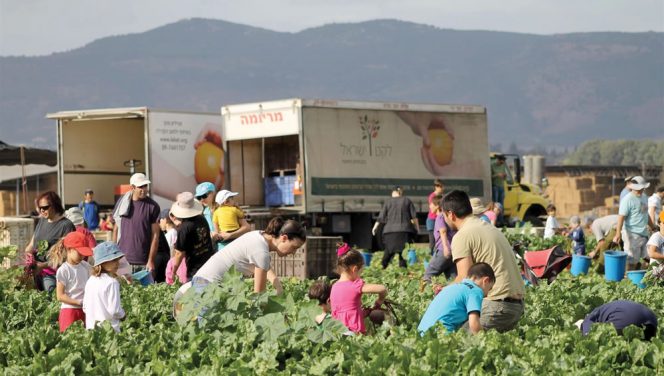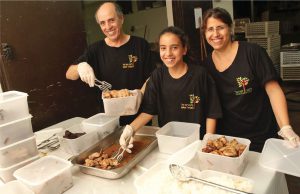Leket Israel’s initiatives include prepared food rescue and distribution, agricultural gleaning, and providing sandwiches for school children.
Claire Siegrist
BioCycle August 2016

In 2014, thousands of volunteers and dozens of paid pickers gleaned 20 millions pounds of leftover fruits and vegetables.
In 2014 alone, Leket Israel rescued and distributed over 30 million pounds of produce and perishable goods and 1.5 million prepared meals to 195 nonprofit agency partners. On a weekly basis, fresh produce, prepared and packaged meals, and perishable goods from 1,000 food suppliers are redistributed to more than 175,000 Israelis. These suppliers include catering companies, corporate cafeterias, private farmers, restaurants, bakeries, supermarkets, wholesale food suppliers and local green grocers. Through the multiple programs, roughly $50 million worth of food is recovered annually.
Food Recovery Projects
The first initiative, the Leket Meal Rescue Project, began in 2003 to collect excess hot meals from restaurants and cafeterias and transport them immediately to soup kitchens and shelters. In 2014, 1.5 million excess meals were collected from 250 banquet halls, restaurants, food courts, large caterers, hotels and corporate cafeterias. Only about 30 shelters receive these hot meals due to food safety regulations, as the food must be consumed on-site at the shelters.
In 2005, Leket began to salvage thousands of tons of surplus produce annually from fields, orchards and packinghouses through gleaning. Farmers may leave crops in the field for many reasons, including low market prices, lack of workers, crop damage or imperfections. In 2014, thousands of volunteers and dozens of paid pickers redistributed 20 million pounds of leftover fruits and vegetables to nongovernmental organizations (NGOs).
Leket is most successful in terms of volunteer participation, as 95 percent of the time volunteers are available. However, it is challenging to find enough volunteers for the Leket Meal Rescue Project to help collect hot meals in the early morning after major events.
In 2006, Leket’s Sandwiches for Kids began to distribute roughly 7,500 to 8,000 prepared sandwiches daily for food insecure children at schools in 40 cities across the country. School administrations and local municipal welfare departments decide which children are eligible to receive the sandwiches. Leket Israel provides freshly baked rolls and the sandwich fillings, and fresh fruits and vegetables, to all participating schools. Sandwiches are prepared on-site by volunteers in the school district. In 2014, roughly 1.2 million prepared sandwiches were distributed throughout the country.
In addition to these food recovery programs, Leket Israel also offers nutrition workshops to Israelis with limited grocery budgets, and food safety support programs to nonprofits.

Leket Israel volunteers package prepared foods donated by banquet halls, restaurants, large caterers and other generators for distribution.
Managing Distribution
A food recovery program of this size requires extensive logistical planning. Leket relies on donations and crowdfunding campaigns to finance an annual operating budget of $10.5 to $15 million. Leket Israel employs over 100 people, one-third of whom are Arab-Israeli women who work in the fields; another third are warehouse workers who drive trucks, recruit new food donors, and manage volunteers; and the remainder work to fundraise and market Leket.
The food bank has two logistics centers equipped with refrigeration systems, 8 refrigerated food cargo trucks, 5 off-road vehicles, and a tractor for agricultural gleaning. The main warehouse, located in Raanana, houses a 40-foot by 26-foot by 18-foot onsite refrigeration room that is used to store thousands of tons of vegetables and dairy products annually in conditions that maintain food quality and safety prior to redistribution. Located in Nesher, the northern logistics center has two trucks which provide the capacity to deliver food donations to about 100 nonprofit agencies in Israel’s north daily. Over 90 percent of the rescued food is transported directly to agencies for distribution.
Once vendors donate their food, it becomes the responsibility of Leket Israel. Prior to handling food, volunteers get a brief training program on food safety. Nutritional staff and truck drivers ultimately decide what food to redistribute. Leket determines the end location of leftover food based on registered agencies’ size, need and location. Agencies can request specific products depending on their needs. Although the majority of recovered food is used to feed the food insecure, a small volume does not meet the quality standards and is composted off site.
Claire Siegrist is a Contributing Editor to BioCycle.










